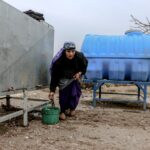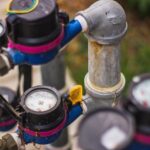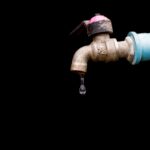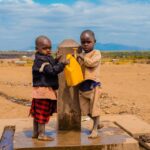The Economic Benefits of Clean Water Access

Clean water access is more than a basic necessity; it is a critical driver of economic growth. In regions where clean water is scarce, communities face higher healthcare costs, reduced productivity, and significant limitations in education and workforce development. Conversely, access to clean water can transform economies by enabling healthier, more productive populations and fostering sustainable industries. Clean water access plays a pivotal role in lifting communities out of poverty and creating a foundation for long-term economic stability.
● Health-Related Economic Benefits
When clean water is readily accessible, communities experience significant reductions in waterborne diseases, such as cholera, typhoid and diarrhea, and this directly lowers healthcare expenses for individuals and governments alike. By lowering the incidence of these preventable diseases, communities experience direct financial benefits, as families spend less on medical care, freeing up resources for other essentials and health care systems are less burdened.
Clean water access also supports better maternal and child health outcomes, which are crucial for long-term economic growth. Infants and young children are highly vulnerable to waterborne diseases, and clean water can dramatically reduce child mortality rates, resulting in healthier, stronger future generations. Healthier children have a greater chance of consistent school attendance, which improves their education and potential economic contributions later in life.
Moreover, a healthy workforce is essential for productivity. When adults are not frequently sick or forced to take time off to care for ill family members, they can work more consistently and contribute more effectively to their families and the economy. This increase in productivity leads to higher earnings for individuals and a stronger local economy as a whole.
By enabling families to allocate their resources toward essentials like education, nutrition, and small business investments instead of medical bills, clean water access creates a foundation for economic resilience and growth. Additionally, healthier communities reduce the overall strain on healthcare systems, allowing governments to allocate funds to other developmental priorities, further enhancing economic stability.
● Education and Workforce Development
Access to clean water has a profound effect on education and workforce potential. When schools have clean water, students are healthier and attend more regularly, leading to better educational outcomes. Access to clean water near homes also reduces the time children, particularly girls, spend collecting water, allowing them more time to study and attend school.
Improved education contributes to a more skilled workforce, which is essential for economic growth. Moreover, when girls and women are freed from water collection duties, they have greater opportunities for economic participation, whether through education or joining the labor market. These opportunities foster a cycle of economic empowerment, lifting communities over time.
● Agricultural and Food Security Benefits
Agriculture is a cornerstone of many developing economies, and clean, reliable water sources are essential for stable crop yields and food security. When farmers have dependable water access, they can produce more, leading to greater food availability and economic stability in farming communities. Increased crop yields translate to higher incomes for farmers, boosting local economies.
Furthermore, secure water access reduces the costs associated with water scarcity, such as investing in expensive irrigation systems or sourcing water from distant locations. In times of drought, communities with clean water sources are better positioned to endure challenges, maintaining economic stability and resilience.
● Industrial Growth and Job Creation
Clean water infrastructure is a key factor in attracting businesses and supporting industrial growth, particularly for sectors that rely heavily on water, such as manufacturing, food processing, and energy. When businesses have consistent access to clean water, they can operate efficiently, meet production targets, and minimize downtime, which supports local economic growth and stability.
Additionally, clean water infrastructure itself creates job opportunities. The development and maintenance of water treatment facilities, distribution networks, and sanitation systems require skilled labor, which can generate a range of employment opportunities in local communities. These water-related jobs not only enhance economic stability but also equip workers with valuable skills, contributing to a more resilient workforce.
● Poverty Reduction and Economic Stability
Access to clean water is essential for poverty reduction. Without it, communities are trapped in cycles of poor health, low productivity, and limited educational opportunities, all of which exacerbate poverty. Conversely, clean water access allows families to save on healthcare costs, access better jobs, and improve their standard of living.
By strengthening local economies and reducing vulnerability to disease and environmental stress, clean water access fosters long-term economic stability. Households can invest in education, small businesses, or other opportunities that would otherwise be out of reach. As poverty levels decrease, communities can focus more on sustainable development, building stronger economies less reliant on outside aid.
● Environmental Benefits with Economic Impact
Protecting water resources has significant environmental and economic benefits, especially for industries like tourism, fishing, and agriculture that depend on healthy ecosystems. Clean water initiatives help preserve natural water bodies, which support local biodiversity, attract tourism, and provide resources for fishing industries. These industries contribute directly to local economies, creating jobs and generating income.
In the long term, sustainable water management practices reduce the economic costs associated with environmental degradation, such as soil erosion, habitat loss, and pollution. By maintaining healthy ecosystems, communities also support resilient agricultural practices, ensuring food security and reducing costs related to land rehabilitation or alternative food sourcing.
● Improved Productivity in Small Businesses and Local Enterprises
Clean water access enhances productivity for small businesses and local enterprises, particularly in industries like food service, agriculture, textiles, and tourism. Consistent water supply supports these businesses by ensuring smooth operations, from food preparation and processing to cleaning and maintenance. Small-scale businesses in these sectors are often essential sources of income for local communities, and access to clean water helps reduce operational costs and downtime.
Consequently access to clean water enhances customer experience, particularly in the hospitality and tourism sectors, where sanitation and hygiene are critical. With clean water access, businesses can maintain high standards, attract more customers, and improve community economic resilience through steady income streams.
● Impact on Real Estate and Property Values
Communities with reliable, safe water supplies see a positive impact on real estate and property values. Access to clean water is a key consideration for prospective homeowners and businesses, as it directly affects quality of life and the operational costs of properties. Real estate values tend to rise in areas with clean, accessible water infrastructure, attracting investments and further stimulating local economies.
High property values, in turn, contribute to local government revenues through property taxes, enabling reinvestment into infrastructure, education, and other essential services. Improved water infrastructure makes communities more appealing places to live and work, driving growth and economic development over time.
● Enhanced Public Hygiene and Sanitation
Clean water access significantly impacts public hygiene and sanitation, which are essential for preventing the spread of diseases and maintaining healthy communities. When communities have access to clean water for drinking, washing, and cleaning, the prevalence of waterborne illnesses and related healthcare costs drop, and public health improves.
Improved public hygiene also benefits local economies by creating healthier work environments, reducing absenteeism, and fostering safer, more welcoming community spaces. Clean, well-maintained environments attract more visitors, support local businesses, and contribute to overall economic well-being, creating a positive cycle of growth and development.
● Boost to Tourism Industry
Clean water is essential for attracting tourists and supporting a thriving tourism industry, especially in regions known for natural attractions like beaches, lakes, and rivers. When water sources are clean and well-maintained, they draw visitors who support local businesses such as hotels, restaurants, tour operators, and shops, generating income and job opportunities for the community.
Additionally, tourists often prioritize destinations with high standards of hygiene and sanitation, which depend on a reliable supply of clean water. A vibrant tourism sector contributes significantly to the local economy, creating opportunities for small businesses and artisans while also boosting public revenue through tourism-related taxes and fees.
● Strengthening Climate Resilience and Community Adaptation
Access to clean water strengthens a community’s resilience to climate change by ensuring reliable resources during extreme weather events, such as droughts or floods. As climate change increasingly impacts water availability, communities with robust clean water systems are better equipped to adapt and maintain stability in agriculture, health, and local economies.
Investing in clean water infrastructure also supports sustainable water management practices, which help conserve resources and protect ecosystems. These adaptive measures reduce economic losses during environmental challenges, contribute to long-term water security, and support community resilience, creating a more stable economic foundation for future generations.
● Empowerment and Development of Women and Girls
Access to clean water has a direct impact on gender equality and the economic empowerment of women and girls. In many communities, women and girls are responsible for collecting water, which can take hours each day if clean water sources are distant. When water is accessible, women and girls can spend more time on education, skill development, and income-generating activities instead.
This empowerment creates ripple effects throughout the community, as women are more able to contribute economically, pursue careers, and actively participate in local development. Gender equity in education and employment strengthens communities, builds a more skilled workforce, and promotes economic growth.
Conclusion
The economic benefits of clean water access span across health, education, agriculture, industry, and community resilience. From reducing healthcare costs and improving educational opportunities to supporting small businesses and supporting climate resilience, access to clean water makes a strong foundation for sustainable development and economic stability.
Aqua Maya is at the forefront of this vital mission, working to provide clean, safe water to communities in West Africa, where access can transform lives and strengthen local economies. Efforts like Aqua Maya’s show the importance of continued investment in clean water infrastructure, which empowers individuals, strengthens communities, and enhances quality of life for all.
Sources:
1. https://www.who.int/news-room/fact-sheets/detail/drinking-water
2. https://www.un.org/sustainabledevelopment/water-and-sanitation/
3. https://www.mdpi.com/2073-445X/8/1/2
4. https://www.adaptation-undp.org/water-resource-management-and-access-water
6. https://www.unwomen.org/en/news/in-focus/women-and-the-sdgs/sdg-6-clean-water-sanitation






